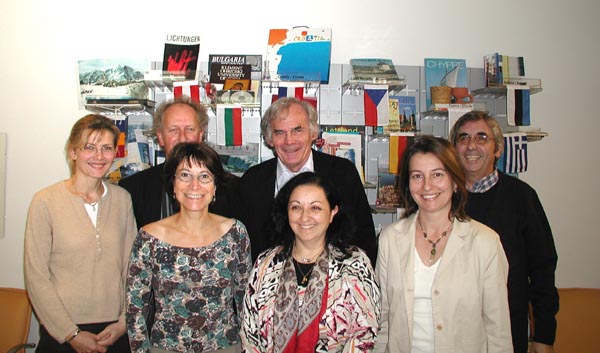The "Framework of reference for pluralistic approaches" (FREPA) as it is now known (Cadre de référence pour les approches plurielles - CARAP), which the ALC project is developing, will exist in four languages (German, English, Spanish and French). Inevitably, such an ambition runs up against the complications of finding terms and expressions which are close enough in meaning in those four languages. Although common European language education instruments do exist (such as those of the Council of Europe), the terminology of didactics in these four languages is strongly marked by the history of each, or by the direction taken, in each country or linguistic domain, by neighbouring disciplines such as linguistic sciences, psychology, ethnography, education studies, etc.
The main aim of the meeting was to discuss a number of questions linked to this search for equivalent terminology. Participants concentrated on the list of descriptors relating to skills (savoir-faire). Work will continue via e-mail for the lists of descriptors relating to attitudes (savoir-être) and knowledge (savoir).
A timeframe was drawn up for completion of the different elements of the FREPA (comments on the lists of descriptors, overall presentation, table of "macro-competences"). The final version of the framework which will be presented at the workshop has still to be completed. The overall document will consist of 60 to 80 pages.
Part of the meeting was dedicated to preparing the presentation/dissemination workshop to be held in Graz from 28 to 30 June 2007. Participants will be expected to provide critical feedback and recommendations concerning the content of the Framework of reference itself, the presentation documents and the accompanying guidelines, as well as ideas on how the document can be used and what added value it provides.
Discussion was also devoted to outlining the continuation of the project, which will be requested within the ECML's third medium-term programme: finalisation of the FREPA and dissemination to its various target audiences (education officials, teacher educators, textbook authors etc), development of complementary resources (in particular pedagogical examples).
October 2006: ALC Preparatory meeting Workshop 2007
Part of the meeting was devoted to discussing the descriptor hierarchies developed by each team member in order to coordinate working procedures.
A theoretical discussion started, having read a paper by P. Perrenoud which led us to make a clearer distinction* between "competences" (which are complex entities requiring different resources according to the specific situation) and the "resources" constituting them (knowledge, skills and existential competence). The "reference framework" we are trying to develop will have to treat these two levels separately:
- 1. The first level will deal with a few general competences related on the one hand to plurilingual and pluricultural communication management and on the other to the construction/development of a diverse linguistic and cultural repertory. Each competence will be provided with 1) a brief explanatory paragraph; 2) an indication of the type of resources and micro-competences it is usually related to; 3) an example of the type of relationship with the relevant resources.
- 2. The second level will include a group of resources classified in terms of knowledge, skills and existential competence in the form of lists presenting related hierarchies where appropriate.
By adopting this approach we discard the objective (which proved unrealistic) of developing a comprehensive structure highlighting all possible relationships (whether inclusive or implied) between all the elements of the future reference framework (from resources to the most general competences). The complexity of these relationships - and the speculative nature of an initially logical organisation, when applied to the diversity of concrete implementation situations, renders this working method impossible to put into practice with the current state of knowledge.
It also seemed useful to limit the reference framework to resources / competences which are either 1) specific to pluralistic approaches; or 2) little or not at all specific to these approaches, but which are more easily developed through these.
The applicability of these new working principles was tested on a sample of data.
A timeline was determined concerning the further work on the development of the reference framework and its translation into German, English and Spanish so that it may be presented during the workshop (28-30 June 2007).
*which is not the case within the Common European Framework for example

ALC team

May 2006: ALC team meeting
At the meeting on 21-22 May the composition of
the ALC team was reviewed with regard to the feasible possibilities for
collaboration.
The work-plan was redefined according to a revised set of objectives.
It is no longer foreseen to provide a final interactive document with
hypertext, but rather to develop a version of the framework of competences
in the form of a simple Word document, which will have been submitted
to the participants at the workshop in June 2007. This version would be
made available via the ECML website together with a supporting document.
A short provisional printed document presenting an overview of the work
carried out and pointing the reader towards the website could also be
produced.
The main part of the meeting was devoted to a collective review of the
first attempts at formulating the descriptors relating to the competences
to be included in the future framework and at developing hierarchies of
these competences. The process for converting data gathered from different
books and articles into a hierarchy of descriptors was determined and
standard procedures developed. The issue of "cross classifications"
(for example, between typological and chronological organisation of descriptors)
was examined and various solutions envisaged. The work will continue with
a second phase of analysis of books and articles by the next meeting in
October and with the elaboration of complete hierarchies of descriptors
(based on the grids developed during the two phases of analysis). These
hierarchies addressing approximately ten sub domains of competences will
be standardized and reordered in order to compile the framework.

December
2005: 2nd meeting of the ALC project team
The team members firstly reviewed what had been achieved
to date. Although the work had not advanced as far as had been hoped a
collaborative working space has now been established with a bibliography
of over 100 documents to be examined along with the completed evaluation
grids for dozens of documents.
The team carefully examined the bibliography to ensure
that all essential documents were included and to remove any duplication.
They critically reviewed the evaluation grids already completed by each
team member in order to refine and ensure common understanding of the
categories employed. They made initial attempts at compiling the grids
and at regrouping items to develop a hierarchical set of competences needed
to establish the reference framework. As a result they were more clearly
able to see the nature of the work to be carried out from the regrouping
of the grids: where necessary they should not only reformulate competences
in their own terms but should also critically review certain formulations
encountered in the documents which are all too often vague, unrealistic
and sometimes even dangerous. This critical analysis will lead to an (additional)
accompanying document which will be published together with the reference
framework.
The work plan was updated to take account of the current
state of progress of the project and of the better understanding the team
now has of the work to be carried out. The final workshop was rescheduled
for June 2007 where a paper version of the framework (rather than an online
one) will be presented.
Up until the next meeting (May 2006) the team will complete
its work on the evaluation grids and start work on the establishment of
hierarchical typologies of competences. With this objective they divided
up the sub-domains.
A reflective process was also started concerning
the form in which the reference framework should be presented. This process
will continue over the coming months…
First
meeting of the ALC team
So now the go-ahead has been given and the languages and cultures of the world need to be on their guard! A small group of experts, with wide expertise in linguistic and intercultural matters, gathered for the first time, sharpening their tools in order to cut across languages and cultures. However, it is not their intention to cause any harm to these two areas, which are so central to the activities of the ECML, but to enhance the learner's access to them through the establishment of a frame of reference of competences.
With that in mind, the working group started by identifying the competences which have already been highlighted in previously published works. A common grid has been drawn up and tested. This must now be used in the analysis of a several dozens of key documents, many from the Council of Europe.
Before the next meeting in June, the valiant experts in the team will draw up their own list of descriptors and organise them into a hierarchy to form the basis of the proposed frame of reference. They have also started to plan an accompanying glossary in four languages. This will nip in the bud the inconsistencies that have been found in the translations of some of the studies consulted. The icing on the cake will be a list of erroneous translations which will complete the work.


